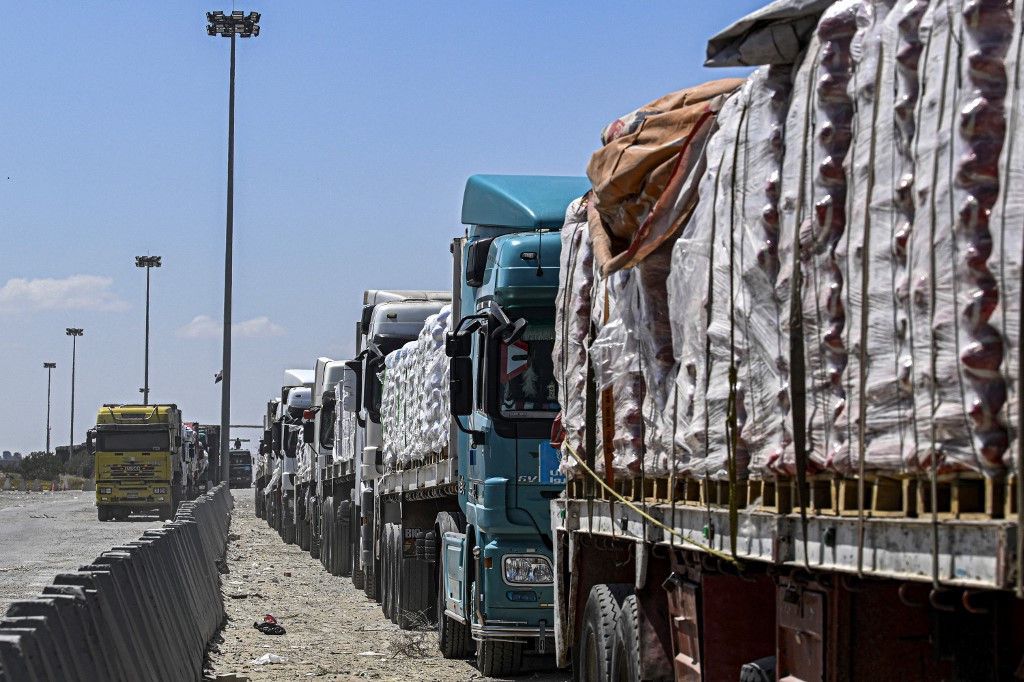– Israel and Hamas remain at odds over truce
During a first round of discussions on Saturday in Egypt, the Palestinian Islamist movement and Israel displayed their differences within the framework of a truce.
On May 4, 2024, thousands of people, including relatives of hostages, demonstrated in Tel Aviv to demand from the Netanyahu government the conclusion of a truce agreement allowing the return of the hostages
JACK GUEZ / AFP
Israel and the Palestinian Islamist movement Hamas have once again displayed their deep disagreement for a truce in the war in Gazacasting a chill over the discussions which are due to resume on Sunday in Cairo.
In the seventh month of the war triggered by a bloody attack by Hamas on October 7 against Israel, the director of the World Food Program (WFP), Cindy McCain, was alarmed to see the north of the Gaza Strip hit by a “real famine”, which is progressing towards the south.
In retaliation for the unprecedented attack by Hamas, the Israeli army launched a major offensive, air and then land, in the Palestinian territory that it besieged, leading to the death of 34,654 people, mainly civilians according to the Hamas, and causing a humanitarian catastrophe and colossal destruction. The Israeli bombings have not stopped.
After a first round of discussions on Saturday in Cairo in the presence of a Hamas delegation led by Khalil al-Hayya and representatives of the mediators Qatar, Egypt, the United States, Israel and the Palestinian movement once again displayed their deep differences in view of a truce.
On Saturday evening, a Hamas official reiterated, on condition of anonymity, that his movement would “under no circumstances accept an agreement that does not explicitly provide for an end to the war.”
“Our information confirms that Benjamin Netanyahu is personally slowing down an agreement through personal calculations,” he told AFP about the Israeli prime minister accused by Hamas of hindering any agreement with his public threats on an assault on Rafah, town in the south of the Gaza Strip.
“No development”
Before him, an Israeli official accused Hamas of blocking any agreement by insisting on its demand for an end to the war, and predicted difficult negotiations. There was “no development” in the first round on Saturday in Cairo and new discussions are planned for Sunday, said an official from Hamas, the movement which took power in Gaza in 2007.
Israel is not present in the Egyptian capital. Another Israeli official said signs of progress would be seen if Mossad chief David Barnea took an Israeli delegation to Cairo. According to the American site Axios, the head of the CIA, William Burns, is in Cairo.
The mediators’ offer presented to Hamas at the end of April provides for a truce associated with the release of Palestinian prisoners in exchange for that of hostages kidnapped during the October 7 attack. On Friday, Hamas said it was going to Cairo with an “open mind”, but insisted on its demands: “a total cessation of Israeli aggression” and “the withdrawal” of Israeli forces from Gaza.
Israel has always rejected these conditions from Hamas, which it considers a terrorist organization along with the United States and the European Union, and which it vowed to annihilate after the October 7 attack.
Protests in Tel Aviv
That day, Hamas commandos infiltrated from Gaza in southern Israel launched an attack which resulted in the death of more than 1,170 people, mainly civilians, according to an AFP report based on official data. Israelis. During the attack, more than 250 people were kidnapped and 128 remain captive in Gaza, 35 of whom died, according to the army.
A protester carries a Menorah as parents and relatives of hostages captured by Palestinian militants stage a demonstration to demand their release, in the Israeli coastal city of Tel Aviv, May 4, 2024
JACK GUEZ / AFP
On Saturday evening, thousands of people, including relatives of hostages, demonstrated in Tel Aviv to demand that the Netanyahu government conclude a truce agreement allowing the return of the hostages.
In a statement, the Forum of Hostage Families called on Benjamin Netanyahu “to ignore political pressure” and accept an agreement that would allow the release of the hostages. “Mr Netanyahu, history will not forgive you if you miss this opportunity.”
While efforts for a truce are increasing, Benjamin Netanyahu continues to declare his intention to lead a ground offensive on Rafah, a city which according to him constitutes the last major bastion of Hamas in the Palestinian territory.
Humanitarian aid “very insufficient”
The United States, Israel’s main ally, has repeatedly expressed its opposition to an assault on this city where there are 1.2 million Palestinians, most of them displaced by the war. “The damage it would cause would be beyond what is acceptable,” warned Secretary of State Antony Blinken, as the student movement against the Israeli offensive continues around the world.
Rafah, located on Egypt’s closed border, is the main land crossing point for humanitarian aid. An offensive would be a “hard blow” to humanitarian operations, the UN warned. International aid, strictly controlled by Israel and arriving via Rafah, remains very insufficient to meet the needs of some 2.4 million Gazans.

Egyptian trucks carrying humanitarian aid to the Gaza Strip queue in front of the Rafah border crossing on the Egyptian side, March 23, 2024
Khaled DESOUKI / AFP
“When you have conflicts like this, with so much emotion, where so much is happening, famine happens,” said WFP Director Cindy McCain, according to an excerpt of an interview broadcast Friday by NBC . In Gaza, “the famine is there, a real famine in the North, and which is moving towards the South,” she said, calling for a ceasefire and “unhindered access” to Gaza for provide help.
On Saturday evening, the Israeli army announced that an Islamic Jihad brigade leader in Rafah identified as Ayman Zaarab and described as one of the commanders of the October 7 attack, as well as two other members of the group, had been killed in the south of the Palestinian territory.
AFP
Did you find an error? Please report it to us.
0 comments








